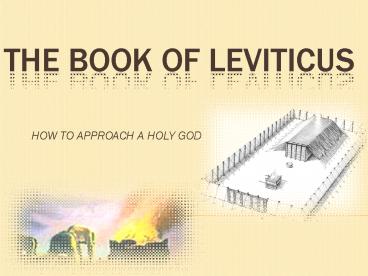THE BOOK OF LEVITICUS - PowerPoint PPT Presentation
1 / 8
Title:
THE BOOK OF LEVITICUS
Description:
All of Lev 1:1 - Num 10:10 took place in a period of 1 month and 20 days. ... Chapters 1-16 deal basically with Israel's relationship with a HOLY GOD ... – PowerPoint PPT presentation
Number of Views:842
Avg rating:3.0/5.0
Title: THE BOOK OF LEVITICUS
1
THE BOOK OF LEVITICUS
- HOW TO APPROACH A HOLY GOD
2
Introduction TO LEVITICUS
- The historical setting
- Israel is at the foot of Mt Sinai
- Almost all legislation
- All of Lev 11 - Num 1010 took place in a period
of 1 month and 20 days. - 1 historical sectionLev 10
- Leviticus is a book of RELATIONSHIP
- Chapters 1-16 deal basically with Israels
relationship with a HOLY GOD - Chapters 17-27 deal primarily with Israels
relationship with EACH OTHER
3
OVERVIEW OF LEVITICUS
- Israels relationship with God
- Sacrificial system
- Leviticus 1-7 5 different types of sacrifice
- Burnt offering
- Grain offering
- Fellowship (peace) offering
- Sin (or, purification) offering
- Guilt (or, reparation/compensation) offering
4
Leviticus 16 The Day of Atonement
- Day of Atonement
- Purification of sanctuary
- Sprinkled on the mercy seat
- Cloud of smoke from incense (Lev 1612-13)
- Sending away the scapegoat
- Two goats were brought. Cast lots to see which
would be sacrificed and which would be sent
away. The one sacrificed purified the
tabernacle, and other was sent away into the
wilderness bearing the sins of the nations. - Two burnt offerings
- 1 from the people and 1 from the priests.
5
General pattern for animal sacrifices
- Questions
- Why the laying on of hands?
- Ownership
- Identification
- What is the significance of the blood?
- Sprinkled on the sacred objects of the tabernacle
- Sprinkled against the bronze alter (Lev 15, 11,
15 32, 8, 13 72) - These ritual actions reflect the importance with
which the ancient Israelites viewed blood it
symbolized life. For this reason sacrificial
blood was a powerful antidote to the deathly
consequences of sin and impurity (Alexander,
219).
6
The laws concerning uncleanness (11-15)
- What is the rationale behind the clean and
unclean animals? - Hygienic the regulations for eating certain
types of animals were for health reasons. Unclean
animals were not safe to eat. - Unclean animals were connected with non-Israelite
religions. E.g. pigs were eaten in Canaanite
rituals. - The clean and unclean animals parallel clean and
unclean people. - unclean animals were those who ate meat
(carnivores) they needed the death of another
animal to survive (The birds of 1113-19 are
birds of prey) - eating clean animals reminded the Israelites that
they were to be clean. - not eating animals that the surrounding nations
ate was designed to keep them from associating w/
these other nations they were to be holy (Lev
2024-26).
7
A wrong way to approach God (Lev 10)
- Notice that this is the one narrative passage in
the book of Leviticus. - Who were Nadab and Abihu? the first and second
of the four sons of Aaron (cp 1 Chron 63) - What was the sin of Nadab and Abihu?
- they "offered strange fire" upon the altar of the
Lord - What was this strange fire?
- Brought coals from a pagan altar and mixing them
with the coals on the altar in the courtyard of
the tabernacle? - They were drunk (cf. 109)?
- MAIN POINT 103
8
B. Israels Relationship with each other
- Misc. Laws in Lev 19-20
- Economics in Gods land (Lev 23-27 Deut 14-15)
- Shared Access
- Responsibility to Work
- Controlled Economic Growth
- Sabbath
- Sabbath year
- 3 festivals where all would travel to Jerusalem
- Year of Jubilee
- Equal Distribution
- things put in place to prevent rich getting
richer, poor getting poorer, and over
consumption. - Deut 154 (no poor among you) 1511 (but there
always will be)

